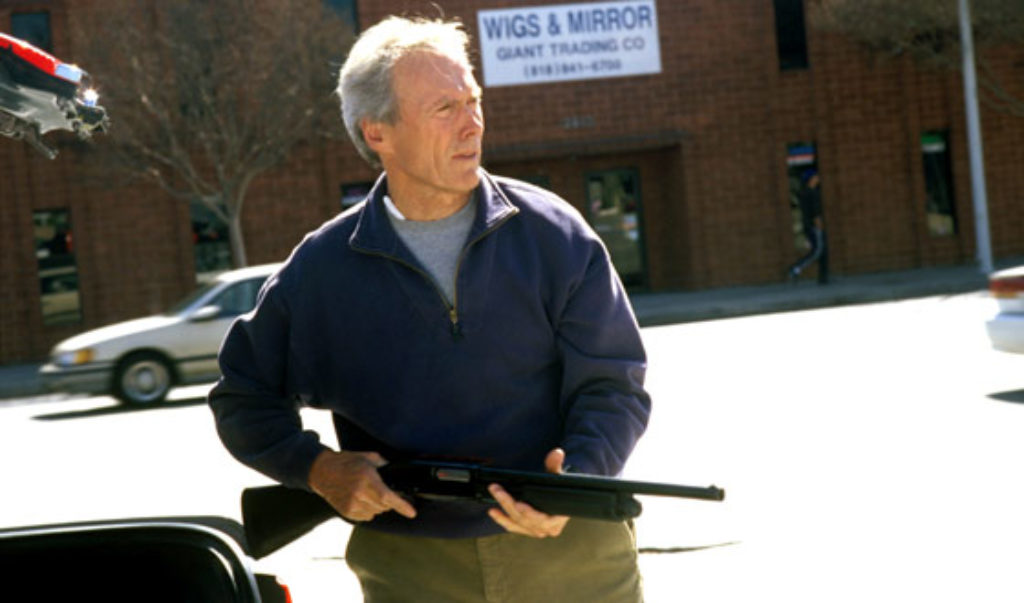
The 72-year-old Clint Eastwood has starred in 44 films and directed 23. He began his film career in 1955. I tell you that not because the statistics are all that exciting, but because it makes it easier to say what I have to say next. Clint Eastwood is getting up there. Granted, his character in Blood Work is a retired FBI profiler recovering from a heart transplant, but you just can’t help but want to tell Eastwood, “You look like you need a nap.” It’s something several of his friends actually do tell him during the course of the film.
Blood Work is “Dirty Harry: The Retirement Years.” Not that that’s necessarily an insult. Nobody could pull it off quite the way Eastwood does. He might be rickety. He might have to take handfuls of pills to get through the day. He might need a nap. But he’s still looking to make some bad guy’s day. In this case, the unlucky punk is a serial killer with a twisted affection for the chase. He loves the cat and mouse game, the thrill he gets when Eastwood’s Terry McCaleb closes in for the kill.
For his part, McCaleb methodically brushes aside the red herrings, follows the freshening scent and ultimately unravels the mystery. The film opens with him chasing his perp through dark alleyways. But just as he’s about to snag the guy, his heart gives out on him. A massive coronary puts him on a waiting list for a heart transplant. Two years later, the transplant is completed and McCaleb is peacefully recovering aboard his houseboat (he doesn’t like mowing lawns). That’s when the sister of a recent murder victim shows up and informs him that what’s beating inside his chest is her sister’s heart. She wants him to track down the killer. His doctor doesn’t want him to—in fact, she orders him not to. And he’s not sure he’s up to the challenge, but McCaleb’s loathe to let even one get away. So he recruits a houseboat neighbor (Buddy) to drive him around and he sets out to solve the crime.
positive elements: When law enforcement finds its man, that’s always positive. A finely tuned sense of justice and a passion for truth dominate McCaleb’s life. “An accident is fate,” McCaleb insists, “but murder is evil.” Demonstrating the disastrous after-effects of an untimely death, a victim’s young son is shown to be suffering from his mom’s absence. McCaleb makes a point of reminding moviegoers that guns are not playthings and should never be left where children can find them. He also criticizes another cop for joking about murder.
spiritual content: McCaleb makes a crack about a suspect standing out from the crowd “like a whore in a church.” A key element of the puzzle is a dangling cross earring.
sexual content: McCaleb and Graciella (the victim’s sister) kiss passionately onscreen. She caresses his bare chest. Then they apparently have sex offscreen. They’re seen afterwards lying together in bed. Several crude sexual comments are tossed around by detectives. Buddy makes at least two vulgar sexual references.
violent content: A foot chase ends with McCaleb collapsing. But before he goes down, he fires his pistol at the escaping criminal. Murder scenes are shown. Blood splatters and dead bodies are given brief screen time. Black and white surveillance tapes of two murders play repeatedly as McCaleb zeroes in on the killer. In a nightmare, McCaleb sees himself being shot in the chest five or six times (the dream is shown as negative images of black and white footage). Awake, he struggles with an assailant, empties a shotgun into a fleeing car and trades bullets with a machine gunner in the obligatory final shootout. A blood-soaked villain is finally subdued when his head is held underwater and he drowns.
crude or profane language: Close to 10 f-words and 15 s-words. A crop of milder profanities and almost 10 misuses of the Lord’s name also take up audio time.
drug and alcohol content: Buddy drinks beer to assuage his boredom. He’s so fond of the stuff that he asks for cases of it in trade for babysitting.
other negative elements: Buddy rips through a few racial slurs which he directs toward Hispanics.
conclusion: One of the biggest complaints about Eastwood-directed films is their pacing. Putting it kindly, they can be a bit slow. Blood Work is measured, but it only drags in a few spots. On the one hand, the investigation seems distant and dispassionate. On the other, I was grateful Eastwood didn’t go out of his way to glorify the heinous crimes committed as so many directors do. And I found it a relief that not every frame was crammed with bam-bam, slam-jam action. Each plot point is pored over in turn, giving you a sense of solving the crime along with McCaleb. Some will figure it out before others, but even an early gut instinct doesn’t completely ruin the story. Okay, maybe it does, but Buddy’s dry humor and McCaleb’s persistent age defiance make for an amusing combination.
Blood Work doesn’t champ very hard against its rated-R restraints, but it is still rated R. Violence, vulgarity and implied sex are to be expected under the guidelines of such a rating, but that doesn’t mean we should be embracing them. Find a good mystery novel and settle in for a few hours. You’ll have a better time—and a clearer conscience.
